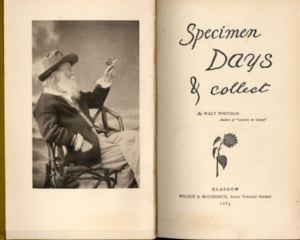
The Stupor Passes—Something Else Begins Walt Whitman
На этой странице вы найдете полный текст песни "The Stupor Passes—Something Else Begins" от Walt Whitman. Lyrxo предлагает вам самый полный и точный текст этой композиции без лишних отвлекающих факторов. Узнайте все куплеты и припев, чтобы лучше понять любимую песню и насладиться ею в полной мере. Идеально для фанатов и всех, кто ценит качественную музыку.

But the hour, the day, the night pass'd, and whatever returns, an hour, a day, a night like that can never again return. The President, recovering himself, begins that very night—sternly, rapidly sets about the task of reorganizing his forces, and placing himself in positions for future and surer work. If there were nothing else of Abraham Lincoln for history to stamp him with, it is enough to send him with his wreath to the memory of all future time, that he endured that hour, that day, bitterer than gall—indeed a crucifixion day—that it did not conquer him—that he unflinchingly stemm'd it, and resolv'd to lift himself and the Union out of it.
Then the great New York papers at once appear'd, (commencing that evening, and following it up the next morning, and incessantly through many days afterwards,) with leaders that rang out over the land with the loudest, most reverberating ring of clearest bugles, full of encouragement, hope, inspiration, unfaltering defiance; Those magnificent editorials! they never flagg'd for a fortnight. The "Herald" commenced them—I remember the articles well. The "Tribune" was equally cogent and inspiriting—and the "Times," "Evening Post," and other principal papers, were not a whit behind. They came in good time, for they were needed. For in the humiliation of Bull Run, the popular feeling north, from its extreme of superciliousness, recoil'd to the depth of gloom and apprehension.
(Of all the days of the war, there are two especially I can never forget. Those were the day following the news, in New York and Brooklyn, of that first Bull Run defeat, and the day of Abraham Lincoln's death. I was home in Brooklyn on both occasions. The day of the murder we heard the news very early in the morning. Mother prepared breakfast—and other meals afterward—as usual; but not a mouthful was eaten all day by either of us. We each drank half a cup of coffee; that was all. Little was said. We got every newspaper morning and evening, and the frequent extras of that period, and pass'd them silently to each other.)
Then the great New York papers at once appear'd, (commencing that evening, and following it up the next morning, and incessantly through many days afterwards,) with leaders that rang out over the land with the loudest, most reverberating ring of clearest bugles, full of encouragement, hope, inspiration, unfaltering defiance; Those magnificent editorials! they never flagg'd for a fortnight. The "Herald" commenced them—I remember the articles well. The "Tribune" was equally cogent and inspiriting—and the "Times," "Evening Post," and other principal papers, were not a whit behind. They came in good time, for they were needed. For in the humiliation of Bull Run, the popular feeling north, from its extreme of superciliousness, recoil'd to the depth of gloom and apprehension.
(Of all the days of the war, there are two especially I can never forget. Those were the day following the news, in New York and Brooklyn, of that first Bull Run defeat, and the day of Abraham Lincoln's death. I was home in Brooklyn on both occasions. The day of the murder we heard the news very early in the morning. Mother prepared breakfast—and other meals afterward—as usual; but not a mouthful was eaten all day by either of us. We each drank half a cup of coffee; that was all. Little was said. We got every newspaper morning and evening, and the frequent extras of that period, and pass'd them silently to each other.)
Комментарии (0)
Минимальная длина комментария — 50 символов.












